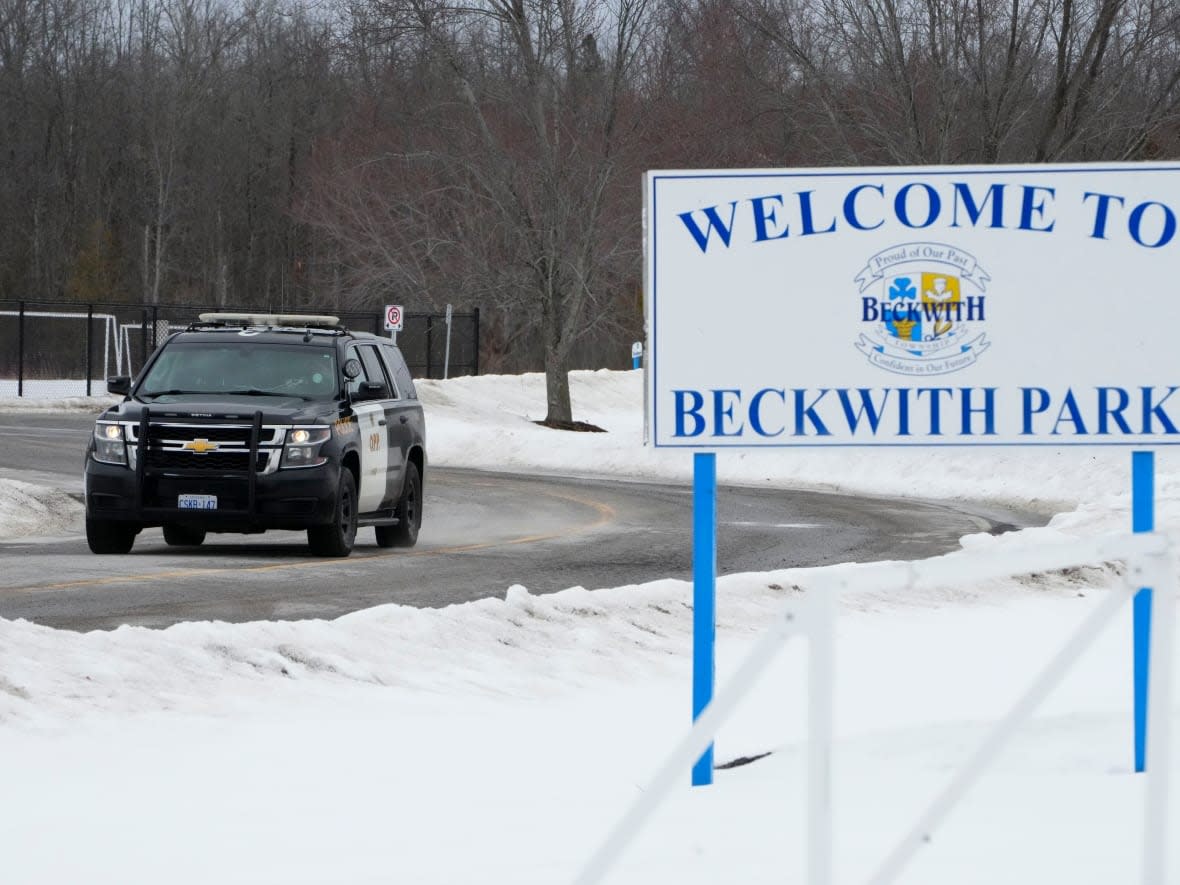OPP urged to own up for releasing personal details in manhunt

Ontario's former privacy commissioner says provincial police need to own up after releasing detailed private information about two men during a manhunt in eastern Ontario last month, only to recall the information after arresting a third person.
On Feb. 10, Ontario Provincial Police (OPP) issued an emergency alert for Lanark County and the neighbouring Sharbot Lake area saying they were investigating two armed suspects at large.
The alert urged people to shelter in place, lock their doors and windows and call 911 if they noticed anyone suspicious.
Police also posted the names, dates of birth, photos and descriptions of two men reported to be armed with a handgun near an arena in Beckwith Township through its social media accounts, on the provincial Alert Ready website and in a news release.
"All of a sudden in [the public's mind], these two individuals are guilty," said Ann Cavoukian, who served three terms as Ontario's privacy commissioner. She is currently the executive director of the Global Privacy and Security by Design Centre.
"It can be very damaging to the innocent individuals."
Hours later, information was removed with little explanation. Later that afternoon, OPP announced they had arrested a different man earlier that day on charges related to a stolen vehicle.

Four days later, police provided limited details in a news release about what led to the emergency alert and subsequent retraction.
The release stated "These men both have a history of violence and multiple criminal convictions" and suggested while the alert was no longer valid, both men still had outstanding warrants for their arrest.
"It's still a mistake to have released their names and pictures in association with the particular crime that it turns out they really weren't linked to. So at the very least, I think they should have said that," said Cavoukian.
Both men have since been taken into custody following the emergency alert, police said. CBC reached out to their lawyer for comment but did not hear back in time for publication.

Cavoukian suggested police might be trying to issue emergency alerts more quickly following the significant criticism levelled at the RCMP in Nova Scotia during the Mass Casualty Commission.
The Commission is examining the police response to a man disguised as a Mountie who killed 22 people during a 13-hour rampage in Portapique, N.S., in April 2020.
"When you point to someone as having committed a particular crime, you have to be very serious about having evidence that demonstrates they're involved in this crime, not crimes of the past that they may have perpetrated," she said.
Police also confused
Weeks later, OPP are offering a slightly clearer picture of what happened that Friday following the arrest of a man in a stolen vehicle.
Police spokesperson Bill Dickson said the arrest of the third suspect actually led to information about the two individuals who were believed to be "armed with a handgun in the Carleton Place area."
"We didn't know where they might be going, what their plans might be," said Dickson of the men who were named.
At that point, a critical incident commander — a higher-ranking officer trained to deal with armed situations — on the ground would have made the decision to issue an emergency alert in consultation with the OPP's provincial operations centre in Orillia, said Dickson.
"When you've got someone you believe to be out there and armed and potentially a public safety hazard, we need to get out as much information to the public as we can," said Dickson.

Not long after the alert was issued, Dickson said officers discovered they were given false information.
"We were confused, too. We had so many moving parts," he said.
Dickson stopped short of offering an apology to the two men.
"They were both wanted on warrants [that were] not related … [for allegedly] significant violent offences. They both had serious criminal histories and we wanted to get these people arrested," he said.
Minutes matter, says public warning specialist
Tim Trytten, former head of the Alberta Emergency Alert program and a public warning and communications specialist, said police face a challenging trade-off when deciding whether to alert the public.
Officials could wait to ensure they are absolutely certain about a suspect — and be late — or they could move quickly and be wrong. In the end every minute matters, he said.
I always find it's easier to apologize for being wrong. - Tim Trytten, Public warning specialist
"I always find it's easier to apologize for being wrong than it is to be able to say to the family, 'Well, I'm sorry we knew, but we said nothing," said Trytten, who appeared before the Mass Casualty Commission last year.
He said he doesn't believe the alert was issued recklessly, but there's always ways to improve.
"The cost of being wrong … can be potentially very high. So you always err on the side of caution," he said.
"It's inconvenient for you to receive an alert, but it's a lot worse if something bad happens."


